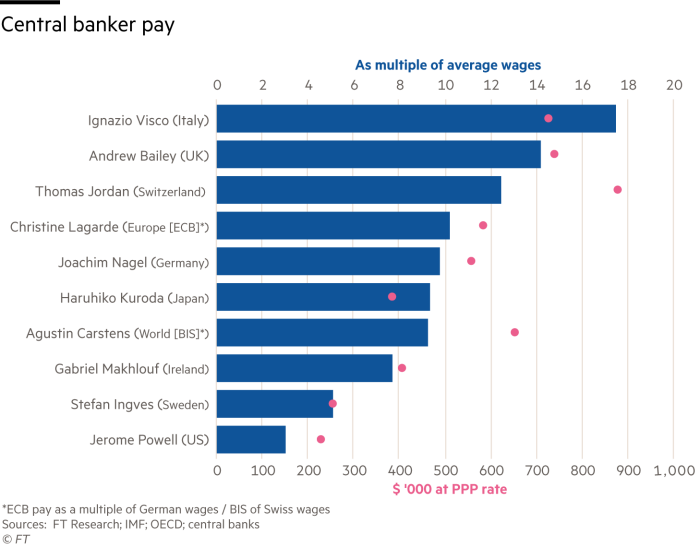If Jay Powell is the most powerful central banker in the world you would not know it by his pay cheque. Even the worst-paid chief is in no position to lecture workers about curbing wage demands, though inflation-linked settlements have central bankers badly rattled.
Powell collects the same $226,000 salary as the secretary of state, attorney-general and other top officials. That is modest by comparison with central banking peers let alone the near-$100mn that JPMorgan Chase boss Jamie Dimon took home last year. But it is a multiple of the average US wage. Powell would be tin-eared if he called on workers to tighten their belts.
The Bank of England’s Andrew Bailey whipped up a storm in February when he advised workers to rein in wage demands, especially when he later told MPs he could not remember his exact salary. His basic pay is £495,000 or $730,000 at purchasing power parity exchange rates.
That puts Bailey near the top of a league table of central bankers’ pay. Swiss National Bank’s Thomas Jordan is the highest paid in nominal terms, collecting almost $1mn last year. Switzerland, though, is a pricey place to live. If salary is measured as a multiple of average earnings, Jordan slips behind Bailey.
Top of the rankings using that measure is the Bank of Italy’s Ignazio Visco, who earned almost 18 times the average Italian worker. That was the case even after Mario Draghi’s efforts to curb excessive pay when he ran the bank up to 2011.

Agustín Carstens of the Bank for International Settlements squeezes into the middle of the pack. The BIS, the central banker’s bank, is particularly anxious about workers protecting living standards with index-linked pay deals.
Wage indexation is less common than in the past. So is union membership. Those factors lessen the risk of a self-reinforcing wage-price spiral. But labour markets are tight. Businesses with pricing power will be able to pass wage increases on to customers. Central bankers wanting to earn their keep need to crack that conundrum, rather than chastise workers asking for more.
Lex recommends the FT’s Due Diligence newsletter, a curated briefing on the world of mergers and acquisitions. Click here to sign up.


